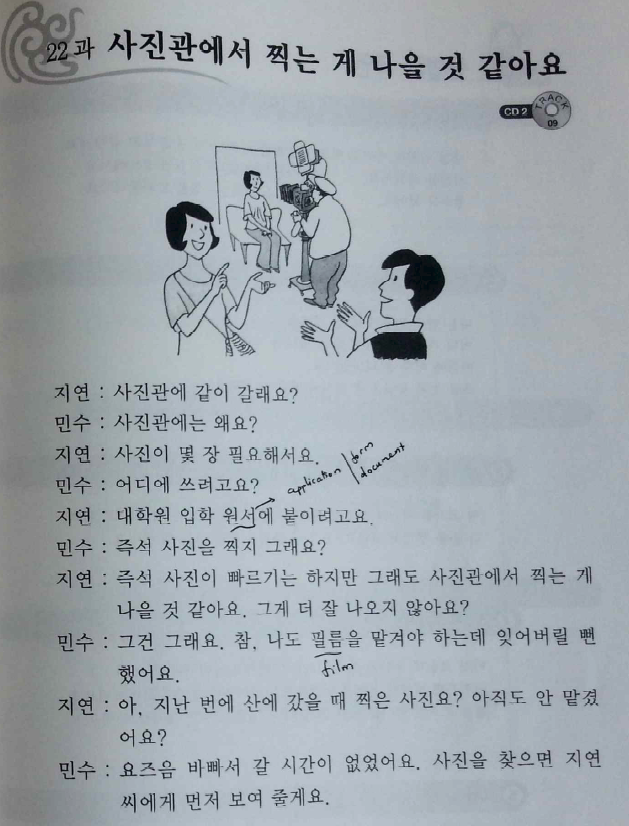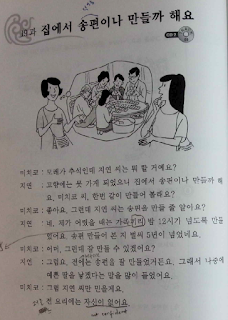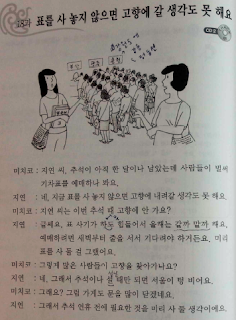Lv3 U23 Why is TV not working?| 툭하면, V-았/었다가, V-았/었는데도, V-기 위해(서) grammar
Listening
Press PLAY button to start listening.
23과 텔레비전이 왜 이렇게 안 나오지요?
나... 글쎄, 어제까지는 잘 나왔는데.... 그렇게 화내지 말고 다시 켜 봐. 다른 채널도 돌려 봐니?
가... 껐다가 다시 켰는데도 잘 안 나오는데요. 이번 기회에 새 걸로 바꾸면 안 될까요?
나... 무슨 소리야? 고쳐서 써야지.
가... 지난번에도 고쳤는데 또 고장이잖아요. 바꿀 때도 됐어요, 어머니. 고치기 위해서 쓰는 돈이 더 많겠어요.
나... 산 지 오래된 물건이라서 정이 들었어.
가... 할 수 없군요. 수리 센터가 몇 번이지요? 고지는 사람을 빨리 불러야겠어요.
* 툭하면: without any reason, to be apt to
* 고장: break down, trouble
* 나다 (고장이): to break down, to become out of order
* 속상하다: to be distressed, to be exasperated
* 켜다: to turn (switch) on
* 채널: channel
* 끄다: to turn (switch) off
* -았/었다가: did something and then
* -았/었는데도: even though, although, in spite of
* 고치다: to fix, repair
* -기 위해(서): in order to, for, for the sake of
* 정(이) 들다: to become attached to, to grow fond of
* 수리 센터: repair shop
* 난로: stove, heater
* 선풍기: electric fan
* 틀다: to turn on (TV)
* 에이컨: air conditioner
* -(으)ㄴ/는데도: even though it (does)
* 을/를 위해서: for the sake of, in the cause of, for
* 찢다: to tear, to rip off
* 전원: power(button)
* 꺼냄: eject (button)
* 재생: play (button)
* 되감기: rewind (button)
* 빨리감기: forward (button)
* 녹화(하다): video recording, to videotape
* 녹음(하다): recording, to record
* 일시정지: pause (button)
* 정지: stop (button)
요즘 툭하면 화를 내는데 왜 그러세요?
내 차를 툭하면 고장이 나서 길에 선다.
That guy suddenly called me and asked for a meeting.
2. 고장이다 : to be broken down
어디가 고장입니까?
Where is it broken?
- There is no sound came out.
Our classroom door is broken, please help us to fix it.
It is said the bus can't go because it's broken. We must wait for another bus.
*고장(이) 나다 : to break down
세탁기가 고장 나서 빨래 못 한 지 사흘이 넘었어요.
The washing machine was broken down so the clothes were not washed for 3 days.
The car was broken on the highway, so it almost caused an accident.
어디가 고장 났어요?
Where is it broken?
- Well, I don't know where it is broken.
3. N을/를 켜다 : to turn (switch) on
방이 추우니까 난로를 켭니다.
The room is cold, so turn on the heater.
Turn on the tap water. I don't know whether hot water comes out now.
Let's turn on air conditioner. The room is quite hot.
4. V-았/었다가 : did something and then (something unexpected happens) ___
I was going to sleep, but a call came, so I wake up.
5. A/V-았/었는데도 : even though, although, in spite of
Although the exam is so difficult, student whose answers are all correct does have.
Although I took medicine, I am worry because my fever does not reduce.
*A/V(으)ㄴ/는데도 : even though, although, in spite of
*N인데도 : even though, although, in spite of
찰스는 외국 사람인데도 한국 노래를 잘 불러요.
There are too much work, although it's Sunday, I went to work.
Although it's winter, person who wear spring clothes does have.
6. 무슨 소리예요? : What? (expression)
- 무슨 소리예요? 술 마실 줄 모르잖아요.
I will go to drink alcohol
- What? You don't even know how to drink.
- 무슨 소리예요? 하루 종일 많이 놀았잖아.
It's great to play more.
- What? You have played the whole day.
- 무슨 소리예요? 그렇게 둘이 좋아했는데.
The two broke up.
- What? They really loved each other.
7. V-기 위해(서) : in order to, for, for the sake of
학비를 벌기 위해서 아르바이트를 할 생각입니다.
In order to earn tuition, I think of doing part time job.
To go travelling, I am saving money little by little.
To enter academy, I am studying Korean.
Father works hard for his family.
Exercise every morning for good health.
Can you do anything for your friend?
8. 할 수 없다 : That's OK (expression)
- 할 수 없지. 우리끼리 가자.
No matter how I say let's go together, no my brother just don't like.
- It' ok. We just go (without him).
- 할 수 없지. 다음엔 꼭 약속 지켜.
I have a sudden work, so I can't go.
- It's ok. Next time, you have to keep your promise.
- 할 수 없지요. 다음에 사세요.
I am lack of my money, what to do?
- It's ok. Buy next time.
Lesson 23: Why is TV not working?
A... Mom, why is TV not working? It's sports news now ... it is suddenly broken. I am so distressed.
B... Well, it worked well until yesterday... Don't get angry like that, and try to turn it on again. Have you tried to switch to another channel?
A.. Although I turned it off, and then turn it on again, it is still not working. Can't we change to a new one this time?
B... What? Fix and use!
A... It's fixed last time, and it's broken again. Mom, it would be ok if we change. It will cost more money to fix.
B... I get familiar to things that bought long ago.
A... It's ok. What is the service center number? I will call service quickly.
23과 텔레비전이 왜 이렇게 안 나오지요?
나... 글쎄, 어제까지는 잘 나왔는데.... 그렇게 화내지 말고 다시 켜 봐. 다른 채널도 돌려 봐니?
가... 껐다가 다시 켰는데도 잘 안 나오는데요. 이번 기회에 새 걸로 바꾸면 안 될까요?
나... 무슨 소리야? 고쳐서 써야지.
가... 지난번에도 고쳤는데 또 고장이잖아요. 바꿀 때도 됐어요, 어머니. 고치기 위해서 쓰는 돈이 더 많겠어요.
나... 산 지 오래된 물건이라서 정이 들었어.
가... 할 수 없군요. 수리 센터가 몇 번이지요? 고지는 사람을 빨리 불러야겠어요.
Label: K4T Level 3











